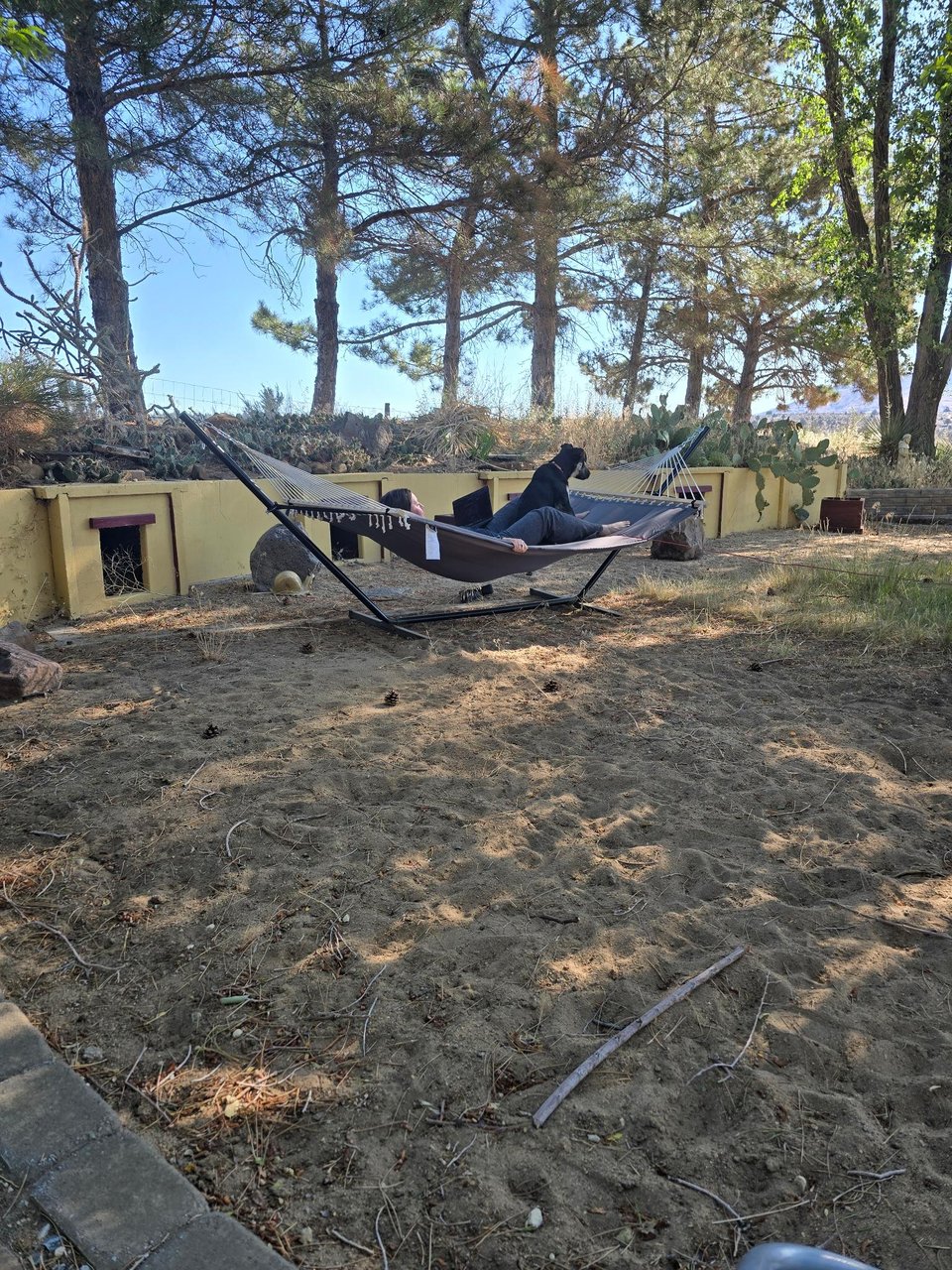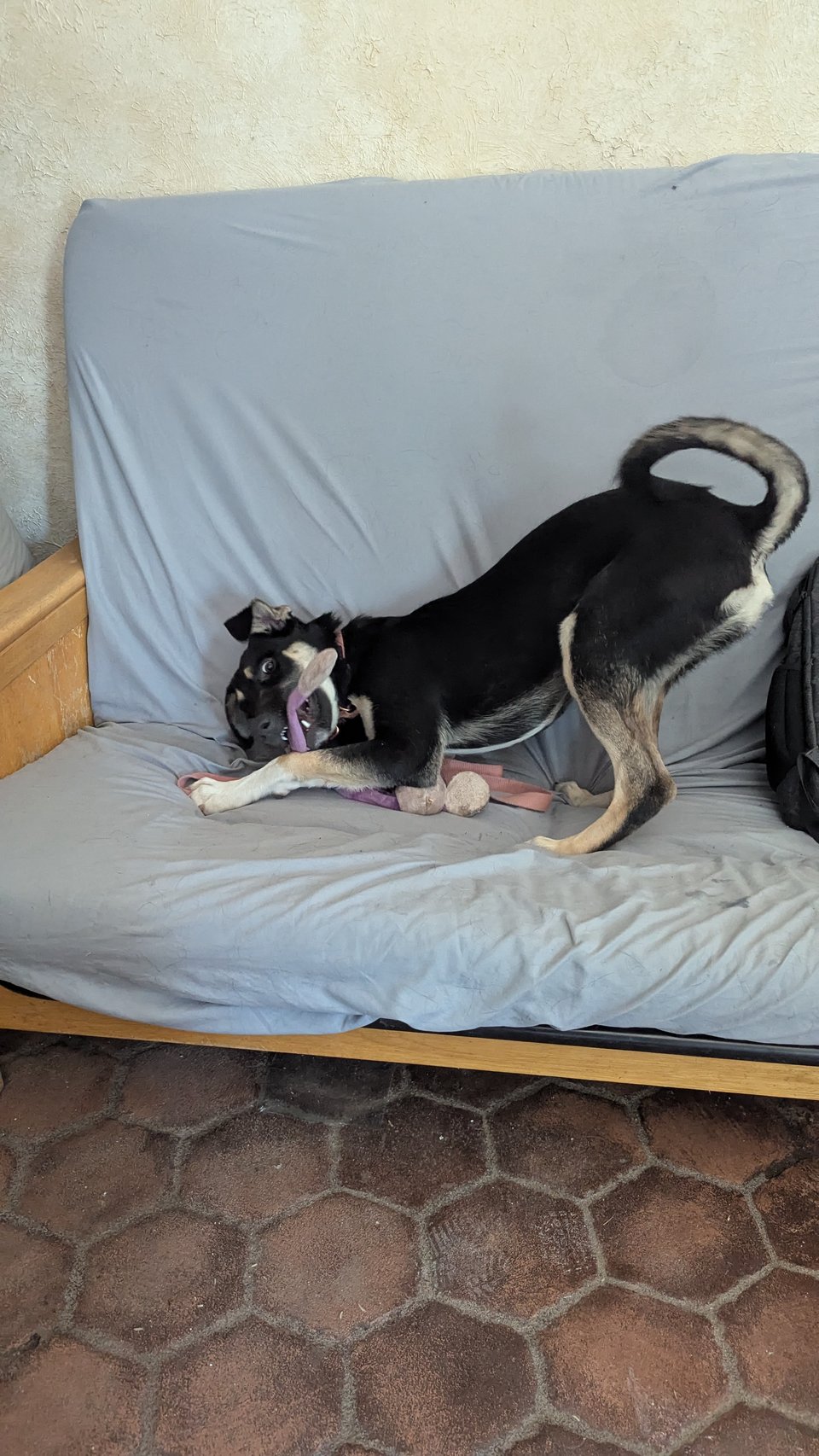Belly laughs and puppy diarrhea
Having a puppy is a fucking nightmare.
My entire life revolves around when this little creature sleeps and shits. She wants to eat everything she’s not supposed to. She wants to be with me constantly and cries when I’m not in the same room. She digs holes in my lawn—you know, the lawn I pay a mortgage for. She’s seven months old and deep in her bratty teenager phase, which means she remembers the commands she knows and chooses whether or not to obey them. Most recently, she’s had a bad reaction to something we’ve been feeding her, so over what was supposed to be a holiday weekend, no one in the house got more than three hours of sleep in an unbroken stretch because the consequence of ignoring her whining in the middle of the night is a pile of absolutely rancid puppy diarrhea.
Her ears are never doing the same thing—one stands up while the other flops to the side, one crooks forward while the other is sleeked back. “Your ears are drunk,” we tell her. She sleeps flat on her back with all four feet in the air and snores like an industrial generator. When she gets excited, all the hair on her back—I mean all of it, from the back of her ears to the base of her tail—stands up in a ridge as thick as my fist. If she’s brave, she stomps in front of me and barks a big kid bark. If she’s scared, she tucks her tail and huddles up against my knees. When we get done at our weekly puppy class, she’s learned four or five new behaviors faster than all the other puppies and I call her “baby genius.” Her favorite thing in the world (other than her Uncle Beamer, who hates her) is a pinecone. She’s responsible for the deepest belly laughs I’ve had in months.

And so summer unfolds in this bright and strange new chapter of my life. It’s hard and it’s good, as much belly laughs as puppy diarrhea.
There’s so much that needs doing on a rural property, but I’m surprising myself with my motivation to do it. In my apartment back in Berkeley, I rarely found the innate desire to sweep the floors or change a lightbulb. This morning I got up early and replaced a wheel on the front gate before it got too hot. Part of it is the puppy; everything I do, she wants to do too, and she has so much energy that it makes sense to drag her on as many little errands as possible. But mostly it’s for the joy of it. I’m learning new things, doing a lot of things for the first time. I’m exhausted a lot. I’m still in so much therapy. But I’m starting to see the shape of it, as bed frames get assembled and books get unpacked. Art goes up on the walls. I can see the shape of my new life.
Writing and workshops and such
Good news first: I’ve been accepted to the 2026 Wayward Wormhole workshop. This is awesome for several reasons—the workshop is on novellas, my favorite kind of fiction to write and read! One of my favorite authors is teaching there, which I’m so excited about and find only a little (a lot) intimidating! And the workshop will be held on Barbados, in a part of the world that I’ve never traveled to before. This little Sagittarius moon loves going new places, and even if I didn’t, it would be hard to argue with a tropical island so rich in culture and natural beauty.
Mediocre news next: My book project? The one I’m ostensibly taking to the workshop? Not going great!
…But it’s not a disaster, either. Here’s how I know the difference: during those first couple years of really trying to learn to write, I set myself the goal of writing one short story a month. Tim said you need to write a million words of shit before you start getting to the really good stuff, and while I’ve probably written a million words in my life, I haven’t written a million words in the last five years. (I doubt I’ve written half a million, honestly—I cracked a hundred K one year, but after that there was a pandemic and my late husband got cancer and life dialed itself up to HARD for about five years.) Anyway, I was trying to learn how to write short stories, and after a year or so I developed a sense of whether a story was going to work, whether it was going anywhere or not. I could tell by the end, then in the second half, then in the first half, then sooner. I always made myself push through to the end, even through the most boring and lackluster conclusion. Sometimes the best thing to do is just end a story so you can start another one. Now I can tell when an idea is too underbaked to make anything with before I start writing anything at all. Three years ago, I would have written a shitty short story before I figured that out.
This book doesn’t feel like that. I can feel the shape of it in my mind, and when I sit down to write I can feel myself writing into a pattern that I can intuit but doesn’t exist yet, one that I will make exist by writing. It’s like a piece of music in that way—I know how the thing is supposed to feel as an entire work, even if I haven’t sung it the whole way through yet.
The problem is that the subject matter is hard to write about. Not intellectually—emotionally. I don’t usually write from the gut the way I am with this book. It hurts to do. I have resistance to sitting down and getting into it on the page, because the subject matter is so close to my own lived experience. It’s also set in the modern world, not a secondary world, which isn’t really my authorial comfort zone, but I don’t think that’s as big a challenge as the topic of the book itself.
Be that as it may, I have to get my shit in gear, because a draft is due by mid-October. I anticipate the entire month of August will be a wash (or, more accurately, a 30-day period between mid-August and mid-September) because historically that’s been when my annual summer job eats most of my life. In a perfect world, I’d have a draft done by the time I leave (mid-August) and be ready to revise it when I get back in September. In an absolutely ideal, divinely planned world, I would have a draft done by end of July and print it out to bring with me and revise while I’m at said summer job. From here on July 10th, that doesn’t seem likely. But a girl can dream.
Fortunately for me, I have enough stuff to put in this book. I almost always know how my books are going to end, but getting there is a challenge—my most common problem is the plot sinew that connects where I start to the end I see. That hasn’t been the case for this book, so far. I see how I’m going to get to the big bombastic ending I received in a flash, the way I always get my endings. It’s going to be a challenge keeping it under 40,000 words.
I would write more about this but the puppy’s eating a pinecone.

Add a comment: